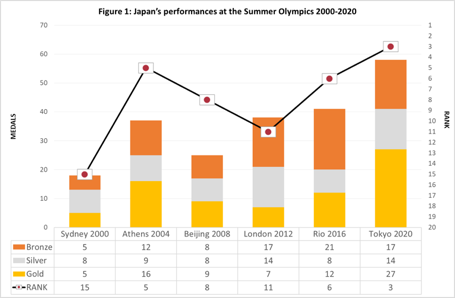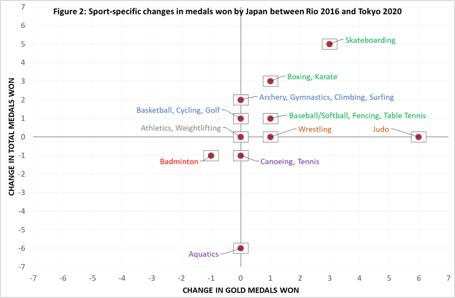
Dr Girish Ramchandani
Associate Professor of Sport Management at Sheffield Hallam University, UK. Girish’s research interests include the impacts of major sports events and performance in elite and professional sport. His work has been published widely in leading sport management journals such as European Sport Management Quarterly.
Twitter: @DrGRamchandani

Section 4: Fandom & National Identity
- The Tokyo 2020 Olympic Games: British imperial identity affirmed
- How much is too much home-nation focus in Olympic coverage?
- South Korea’s changing status and perspective on Japan
- National and ethnic Chinese identities on the Indonesian badminton court
- The Men’s 1500 metres: Not quite erasing the ghosts of history
- Historical disputes, national identity, and the South Korea-Japan summit that did not happen
- Sports betting and the branded purity of the Olympics
- Communicating corporate social responsibility at the Tokyo 2020 Olympic Games
- Silence in the stands: Does it matter for fans?
- Fans as MVP, or the need for sensuous audiences in sport
- Red, white, and rivalry: A brief discussion of United States rivalry at the Tokyo Olympic Games
- Empty stadiums and the other sites of Olympic fandom
- Pop culture diplomacy: Japan’s use of videogames, anime to promote the Olympics and appeal to younger audiences
- Fans as MVP, or the need for sensuous audiences in sport
- Red, White, and Rivalry: A Brief Discussion of United States Rivalry at the Tokyo Olympic Games: Olympic and Paralympic Analysis 2020: Media, Fans and the Politics of Sport
- Empty stadiums and the other sites of Olympic fandom
- At the intersection of COVID-19 and Tokyo Olympics 2020: Vlogs and the expression of Chinese nationalist sentiments
The prevalence of home advantage, a term used to describe a situation where athletes/teams tend to perform better when competing at their home venues relative to when they compete at away venues, is well-documented in professional and elite sport. Such an effect has also been shown to exist in the Olympic Games. Common factors that are thought to contribute to home advantage include the positive influence of the home crowd on athletes, social pressure by home supporters leading to referee bias, travel fatigue experienced by away teams and home teams’ familiarity with their own venues/conditions.
How successful was Japan at Tokyo 2020?
Hosting the Tokyo 2020 Summer Olympics presented an opportunity for Japan to improve upon its previous performances. As shown in Figure 1, Japan won a total of 58 medals (27 gold, 14 silver plus 17 bronze) at Tokyo 2020, which represents the nation’s best ever medal performance in the Games to date. This level of achievement ensured that Japan finished third on the medal table (behind USA and China) – three places higher than at Rio 2016. Japan also doubled the number of sports/disciplines in which it won medals at Tokyo 2020 compared with Rio 2016 (20 versus 10).

The Tokyo 2020 program included five new sports that were not contested at Rio 2016 – baseball/softball, karate, skateboarding, sport climbing and surfing. When considering only those sports that were contested in both editions, Japan won 44 medals at home including 21 golds. The nation’s remaining 14 medals at home including 6 golds were won across the portfolio of new sports. What this means is that while Japan still performed better at Tokyo 2020 in the comparable sports, the nation’s home performance was amplified by the level of success it achieved in the new sports added to the program.
Sport-specific nuances
At individual sport level, Japan’s medal success at Tokyo 2020 relative to its own performance at Rio 2016 can be organized into six clusters, as shown in Figure 2 and described below.
- Cluster 1 (green): Japan increased both its gold medal count and total medal count in six sports at Tokyo 2020. Three of these were new sports (e.g. baseball/softball) – hence the increase in these sports was from a zero base.
- Cluster 2 (orange): Judo and wrestling were the two sports in which Japan won more gold medals, but the overall number of medals achieved remained the same. In other words, the quality of medals improved even though the quantity of medals was unchanged.
- Cluster 3 (blue): There were seven sports in which Japan increased its total medal count but not its gold medal count. Included in this cluster were two new sports (climbing and surfing) where the improvement was from a zero base.
- Cluster 4 (grey): The number of gold and total medals won in athletics and weightlifting remained the same.
- Cluster 5 (purple): This cluster consists of three sports in which Japan won fewer medals of any colour, notably aquatics in which Japan lost six medals.
- Cluster 6 (red): The only sport in which Japan’s performance deteriorated in terms of both gold and total medals was badminton.

Japan versus other Olympic hosts?
Table 1 compares Japan’s improvement at Tokyo 2020 with that of other recent Summer Olympic hosts. The median improvement in gold medals at home for the previous five Olympic hosts was seven and the corresponding improvement in total medals was 14. These host nations also improved their medal table ranking at home by two places on average. The level of relative success achieved by Japan at its home Games was better than the typical level of improvement demonstrated by other recent hosts. What makes Japan’s success as a host nation stand out even more is the absence of spectators from Tokyo 2020 venues due to COVID-19 restrictions, because the home crowd is regarded as a key “game location factor” influencing the occurrence of home advantage.
Table 1: Improvement in gold medals / total medals / medal table position between pre-home and home Olympics by recent hosts
| Host Nation | Comparison | Gold Medals | Total Medals | Rank |
| Australia | 2000 v 1996 | ↑ 7 | ↑ 17 | ↑ 3 |
| Greece | 2004 v 2000 | ↑ 2 | ↑ 3 | ↑ 2 |
| China | 2008 v 2004 | ↑ 16 | ↑ 37 | ↑ 1 |
| Great Britain | 2012 v 2008 | ↑ 10 | ↑ 14 | ↑ 1 |
| Brazil | 2016 v 2012 | ↑ 4 | ↑ 2 | ↑ 9 |
| MEDIAN-1 | 2000 – 2016 | ↑ 7 | ↑ 14 | ↑ 2 |
| Japan | 2020 v 2016 | ↑ 15 | ↑ 17 | ↑ 3 |
| MEDIAN-2 | 2000 – 2020 | ↑ 9 | ↑ 16 | ↑ 3 |
Looking forward to Paris 2024
France has won the right to host the next Summer Olympics in 2024. At Tokyo 2020, France secured 10 gold medals and 33 medals overall. Revisiting the data presented in Table 1, the median improvement at home for all hosts (including Japan) since 2000 is around nine gold medals and 16 total medals. Hence, it may be reasonable to expect France to increase its overall medal tally at Paris 2024 from 33 to 49 and its gold medal tally from 10 to 19, which (if achieved) could see France finish as high as fifth in the medal table.

